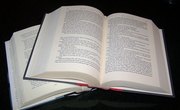Teachers assign different types of essays, and you need to know the components of these essays to make sure you write an effective paper. Main types of essays include expository essays, narrative essays, descriptive essays and persuasive essays. An analytical essay falls under persuasive essays and teachers often refer to a narrative essay as a reflective essay. Understanding some of the differences between reflective and analytical works will help you strengthen your skills to write a strong, effective essay.
Topic
Topics make up the main difference between a reflective and analytical essay. In a reflective essay, you look at a personal story and tell your reader how that event, person or idea impacts your life. In an analytical essay, you look at a topic, such as a social issue or literary work, and evaluate the variety of angles that make up the subject of your essay.
Sources
In a reflective essay, you tell a personal story, so you rely on your memory and perception of events to relate the main idea of your essay. In an analytical essay, you rely on research to prove your perspective on the topic. This means, in your reflective essay, you do not typically cite sources or have a bibliography. However, when you write an analytical essay, you need to make sure that you use credible resources for information and cite any sources you quote or paraphrase. As well, your analytical essay needs a bibliography or “works cited” page to show the references you used to write the essay.
Point of View
In a reflective essay, use of first-person is most common, meaning you use “I” throughout the paper. For example, you may state, “The day I bought the car, I drove home happy.” In an analytical essay, you use a more formal style, typically a third person point of view. Using this, you may state, “After purchasing a car, drivers leave the car lot happy.”
Thesis
The thesis statement, your main idea of the paper, goes in the introduction of your essay. For each type of essay, the thesis will have some differences. In a reflective essay, your thesis statement has a personal nature. For example, you may have the following thesis: “Every car I purchased in my 20s was a step up, and each one made me happier than the last.” The rest of your essay will give examples of this statement.
For an analytical essay, you write a thesis that gives your perspective on a topic. However, you should have a more formal sound and contain an arguable point. Your thesis may look something like this: “When young adults purchase vehicles without doing research, they do not always consider the long-term financial impact of the purchase.” The research you have on the topic will need to back up your statement.
Related Articles
References
Writer Bio
Kate Beck started writing for online publications in 2005. She worked as a certified ophthalmic technician for 10 years before returning to school to earn a Masters of Fine Arts degree in writing. Beck is currently putting the finishing touches on a novel.










